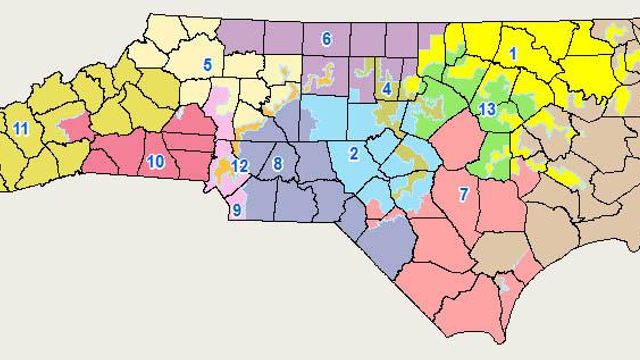NC pays more for GOP voting maps
State Republican leaders have run up $695,000 in private legal expenses for their new voting maps. Taxpayers will have to foot the bill.
Posted — UpdatedAccording to public records obtained by WRAL News, Republican legislative leaders have paid $570,981 to the Raleigh law firm of Ogletree, Deakins, Nash, Smoak and Stewart and $124,067 to the Washington, D.C., law firm of Jones Day. Both firms gave the state a 10 percent discount on fees.
The itemized invoices also show payments made through the law firms to outside consultants.
Through Ogletree Deakins, taxpayers paid GOP redistricting expert Thomas Hofeller $50,163 from last April through November. Hofeller has directed redistricting efforts for the Republican National Committee for the past three cycles.
Also through Ogletree Deakins, a second redistricting expert, Thomas Brunell, was paid $15,000 in June. Brunell is a political science professor at the University of Texas and author of the 2008 book, “Redistricting and Representation: Why Competitive Elections are Bad for America.”
Through Jones Day, the state paid $2,550 to Polidata, a political data analysis firm, for “general consulting.”
In the last cycle, only one taxpayer-funded consultant was listed: NC Democratic operative Kevin LeCount, who was paid about $2,500.
“Our decision to retain award-winning representation at competitive rates has provided voters with the certainty that was lacking in the last redistricting process,” they said, calling the current cycle “the most efficient and successful North Carolina redistricting effort in modern history.”
Lewis and Rucho said their legal counsel had headed off potential disruptions or delays in the election process. “By investing in high-quality legal representation on the front end, we are saving a great deal on the back end,” noting that an extra election could have cost $5 million to $6 million.
The two chairmen also said the legal spending wouldn’t have been necessary “without plaintiffs bringing baseless lawsuits.”
No lawsuits against the redistricting plans were filed until early November. At that time, the outside legal bills had already surpassed $444,000.
“An obligation exists to defend the state, and so far, that is being done successfully,” added Rucho and Lewis, pointing out that Democrats also hired outside counsel in the past two cycles.
Under state law, the obligation to defend the maps resides in the Attorney General’s Office. Attorney General Roy Cooper has had attorneys Alec Peters and Susan Nichols assigned to this case for months. Cooper’s office couldn’t immediately say how much that cost.
The outside legal fees are over and above those expenditures.
Redistricting reform advocates say the hefty price tag is the latest evidence that partisan redistricting doesn’t benefit voters.
Damon Circosta, executive director of the North Carolina Center for Voter Education, said he isn’t surprised by the $65,000 spent on outside experts. He says Hofeller is “the GOP’s gerrymandering guru.”
Under the prior congressional maps, North Carolina's partisan split was seven Democrats to six Republicans. It's now likely to be 10 Republicans to three Democrats.
State House and Senate maps went from a slight Democratic edge to a landslide 3:2 Republican advantage in both chambers.
“Everyone understands that redistricting is for all the marbles. That’s why they spent so much money – they wanted to make sure they locked this down,” Circosta said. “If you’re looking for somebody who knows how to draw partisan districts, these are your guys.”
It’s not just the Republicans, Circosta added.
“The Democrats would have loved to have had the opportunity to spend this kind of money for this kind of outcome,” he said. “In all this partisan squabbling, it’s the voter who ultimately ends up losing.”
He said the $695,000 spent on the new maps would be a substantial down payment on an independent redistricting process, like one used in Iowa.
Democrats say Republicans shouldn't have used taxpayer dollars to draw themselves into power for the next decade.
"Clearly, Republicans in the General Assembly will stop at no expense to ensure that their extreme partisan majority is locked in for years to come,” North Carolina Democratic Party Chairman David Parker said. “Make no mistake about it, Republicans excessively used taxpayer resources to divide our communities, isolate minority voters and to further their discriminatory agenda against North Carolina's women."
In the 2001 cycle, said party spokesman Walton Robinson, Democrats raised private money to pay for the legal fight over the partisan maps they drew. He said Republicans should have done the same.
“They’re just using the taxpayer as a cash register,” Robinson said.
• Credits
Copyright 2024 by Capitol Broadcasting Company. All rights reserved. This material may not be published, broadcast, rewritten or redistributed.





